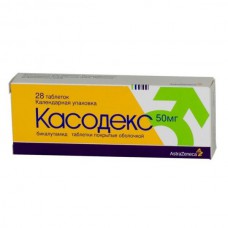Expiration date: 08/2029
The composition and form of issue:
Tablets, film-coated. 1 tablet contains:
bicalutamide 50 mg
excipients: lactose monohydrate povidone magnesium stearate carboximetilkrahmal sodium purified water
the composition of the shell: hypromellose macrogol 300 titanium dioxide purified water
blistere in 14 PCs the paper cartons 2 blister.
Tablets, film-coated. 1 tablet contains:
bicalutamide 150 mg
excipients: lactose monohydrate carboximetilkrahmal the sodium povidone magnesium stearate purified water (evaporated in the production process)
the composition of the shell: hypromellose macrogol 300 titanium dioxide purified water
blistere in 14 PCs the paper cartons 2 blister.
Description pharmaceutical form:
Tablets 50 mg: round, biconvex, white, coated on one side with engraved sign in the form of a curved arrow, on the other — CDX/50.
Tablets 150 mg: round, biconvex, white, film-coated engraved with the logo in the form of a curved arrow on one side and "Casodex 150" on the other.
Pharmacokinetics:
Once inside quickly and completely absorbed from the gastrointestinal tract. Eating does not affect the absorption.
(S)-enantiomer is eliminated from the body much faster (R)-enantiomer, T1/2 last about 7 days.
In case of daily administration of bicalutamide, the concentration of (R)-enantiomer in the plasma is increased about 10 times due to the long half-life, making possible the drug 1 time per day.
With a daily intake of bicalutamide at a dose of 50 mg equilibrium concentration of (R)-enantiomer in plasma is about 9 mcg/ml at a dose of 150 mg, approximately 22 mg/ml At steady state of about 99% of all circulating in the blood of enantiomers is active (R)-enantiomer. On the pharmacokinetics of (R)-enantiomer are not influenced by age, impaired renal function, mild and moderate hepatic impairment. There is evidence that patients with severe impaired liver function slows elimination of (R)-enantiomer from plasma.
The plasma protein binding is high (for racemic mixture of 96% for (R)-enantiomer — 99,6%). Extensively metabolized in the liver (by oxidation and formation of conjugates with glucuronic acid). Metabolites are excreted with urine and bile in approximately equal proportions.
The average concentration of (R)-enantiomer in semen of men receiving Casodex at a dose of 150 mg, is 4.9 µg/ml. Amount of bicalutamide which may potentially occur in women after unprotected sex, low and amounts to approximately 0.3 µg/kg (the value of this index lower than that required for changes of fetal development in laboratory animals).
Description pharmacological action:
Casodex is a racemic mixture of nonsteroidal antiandrogenic activity predominantly (R)-enantiomer, has no other endocrine activity. Casodex binds to androgen receptors without activating gene expression, inhibits the stimulatory influence of androgens. The result is a regression of neoplasms of the prostate.
In some patients, discontinuation of Casodex can result in the development of the clinical syndrome of androgen.
When applying the Casodex at a daily dose of 150 mg daily for the treatment of patients with locally advanced (T3–T4, any N, M0 or any T, N+, M0) prostate cancer as immediate or adjuvant hormonal therapy significantly reduces the risk of disease progression and bone metastases.
In locally-advanced prostate cancer marked trend towards improved life expectancy without evidence of disease progression in groups of patients taking Casodex at a dose of 150 mg as immediate or adjuvant therapy compared with standard therapy (surgical treatment, radiation therapy).
Shown to increase life expectancy among patients with locally advanced prostate cancer treated with Casodex at a dose of 150 mg as immediate monotherapy and as adjuvant treatment in combination with radiation therapy.
The use of Casodex at the 150 mg dose compared to surgical castration in patients with locally advanced nemetstaticescoy prostate cancer did not reveal statistically significant differences in life expectancy and time to progression with statistically significant advantages in relation to sexual function and physical condition.
Indications:
Casodex 50 mg:
in combination with a GnRH analogue (gonadotropin-releasing hormone) or surgical castration for the treatment of advanced prostate cancer.
Casodex 150 mg:
- as immediate monotherapy or adjuvant therapy in combination with radical prostatectomy or radiotherapy in patients with locally advanced prostate cancer
- as monotherapy for the treatment of patients with locally advanced nemetstaticescoy prostate cancer when other medical interventions are not acceptable or not applicable.
Contraindications:
- hypersensitivity to bicalutamide or other components of the drug
- concurrent administration with terfenadine, astemizole and cisapride
- should not be administered to children and women.
With caution:
the liver dysfunction.
Side effects:
Pharmacological action of bicalutamide may cause the following side effects:
very often (&ge10%) — gynecomastia (may persist even after cessation of therapy, especially in the case of the drug for a long time), breast tenderness, tides blood to a person
frequently (&GE. 1% and <10%) i=""> — diarrhea, nausea, transient increase in liver transaminases, cholestasis and jaundice (the described changes of the liver have rarely been assessed as severe, were transient, and completely disappeared or decreased with continued therapy or after drug discontinuation), pruritus, asthenia in applying the drug in a daily dose of 150 mg — alopecia or restoration of hair growth, decreased libido, sexual dysfunction, weight gain
rarely (&ge0,1%–<1%) i=""> — hypersensitivity reactions, including angioneurotic oedema and urticaria, interstitial lung disease when using the drug in a daily dose of 150 mg abdominal pain, depression, dyspepsia, hematuria
very rare (&ge0,01%–<0,1% i=""> — vomiting, dry skin (with the use of the drug in a daily dose of 150 mg dryness of the skin occurs often), hepatic failure (cause-and-effect relationship with the admission of bicalutamide significantly not installed).
While the use of Casodex and GnRH analogues may experience the following adverse events with frequency &GE. 1% (causal relationship to drug intake is not installed, some of the reported side effects were found in elderly patients).
From the side of cardiovascular system: heart failure.
From the digestive system: anorexia, dry mouth, dyspepsia, constipation, flatulence.
From the nervous system: dizziness, headache, insomnia, hypersomnia.
The respiratory system: shortness of breath.
From the urogenital system: sexual dysfunction, nocturia.
From the side of hematopoietic system: anemia.
The skin and its appendages: alopecia, rash, sweating, hirsutism.
Other: diabetes mellitus, hyperglycemia, increase or decrease in body weight, abdominal pain, chest pain, pain in the pelvic area, chills.
Drug interactions:
No data on pharmacodynamic or pharmacokinetic interactions between Casodex and GnRH analogues.
In vitro studies showed that (R)-enantiomer of bicalutamide is an inhibitor of CYP3A4, to a lesser extent affecting the activity of CYP2C9, 2C19 and 2D6. Potential ability of Casodex interactions with other drugs not detected, however, when you use Casodex for 28 days in patients receiving midazolam, midazolam AUC increased by 80%. Incompatible with terfenadine, astemizole, cisapride.
Use caution when assigning Casodex simultaneously with cyclosporine or BPC. You may need a lower dose of these drugs, especially in the case of potentiation or development of adverse reactions. After the start of use or cancellation of the Casodex is recommended to closely monitor the concentration of cyclosporine in plasma and the clinical condition of the patient.
The simultaneous use of Casodex and drugs, oppressive microsomal oxidation of drugs, such as cimetidine or ketoconazole, may lead to increased concentration of bicalutamide in plasma and, possibly, the incidence of side effects.
Enhances the action of anticoagulants of the cumarin series (warfarin).
Method of application and dose:
Casodex 50 mg: inside, adults and older men in advanced prostate cancer in combination with GnRH analogue or surgical castration, 50 mg 1 time a day. Treatment with Casodex should be started simultaneously with start of reception of GnRH analogue or surgical castration.
Casodex 150 mg: inside, adults and older men with locally advanced prostate cancer — 150 mg 1 time per day. Casodex should be taken long-term, at least for 2 years. If signs of disease progression, the drug should be discontinued.
Not require dose adjustments in patients with impaired renal function, mild liver dysfunction. In patients with moderate and serious disturbances of liver function may experience increased accumulation of Casodex.
Overdose:
Cases of overdose in humans have not been described.
Treatment: symptomatic therapy. There is no specific antidote. Dialysis is not effective because bicalutamide binds strongly to proteins and is not excreted in the urine unchanged. Shows a General supportive treatment and monitoring of vital body functions.
Special instructions:
Given the possibility of slowing down the excretion and accumulation of bicalutamide in patients with impaired liver function, it is advisable periodically to evaluate liver function. Most of the changes in liver function occur during the first 6 months of treatment with Casodex.
In the case of pronounced changes in liver function receiving Casodex should be discontinued.
Patients with disease progression on higher level prostatespecific antigen it is necessary to consider the issue of termination of treatment with Casodex.
In the appointment of Casodex patients receiving anticoagulants cumarin series, it is recommended to regularly monitor the prothrombin time.
Given the possibility of casodex inhibiting the activity of cytochrome P450 (CYP3A4), caution should be exercised with concomitant administration of Casodex with drugs primarily metabolized by CYP3A4.
Patients with lactose intolerance should be informed that each tablet of Casodex dose of 50 mg contains 61 mg of lactose monohydrate in the dose of 150 mg — 183 mg.
Bicalutamide is contraindicated in women and must not be administered to pregnant and lactating mothers.
Casodex does not affect the ability of patients to drive vehicles or doing other potentially hazardous activities, require high concentration and psychomotor speed reactions.



